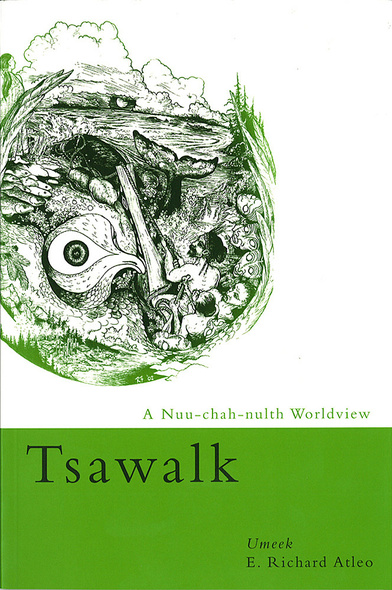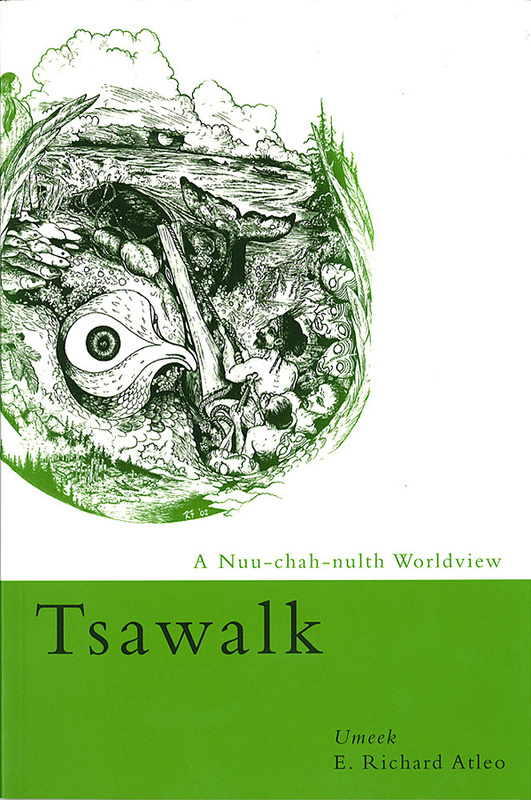Our shopping cart is currently down. To place an order, please contact our distributor, UTP Distribution, directly at utpbooks@utpress.utoronto.ca.

Western philosophy has long held scientific rationalism in a place of honour. Reason, that particularly exalted human quality, has become steadily distanced from the metaphysical aspects of existence, such as spirit, faith, and intuition.
In Tsawalk, hereditary chief Umeek introduces us to an alternative indigenous worldview -- an ontology drawn from the Nuu-chah-nulth origin stories. Umeek develops a theory of "Tsawalk," meaning "one," that views the nature of existence as an integrated and orderly whole, and thereby recognizes the intrinsic relationship between the physical and spiritual. By retelling and analyzing the origin stories of Son of Raven and Son of Mucus, Umeek demonstrates how Tsawalk provides a viable theoretical alternative that both complements and expands the view of reality presented by Western science. Tsawalk, he argues, allows both Western and indigenous views to be combined in order to advance our understanding of the universe. In addition, he shows how various fundamental aspects of Nuu-chah-nulth society are based upon Tsawalk, and what implications it has today for both Native and non-Native peoples.
A valuable contribution to Native studies, anthropology, and philosophy, Tsawalk offers a revitalizing and thoughtful complement to Western scientific worldviews.
It provides a holistic, spiritual perspective, in contrast to the objective, Cartesian perspective of western science. Atleo argues, successfully I believe, that this spiritual view of nature is in many ways superior to the western disenchantment of the world. This book is one that will be valuable for scholars of the Northwest Coast, traditional ecological knowledge, and indigenous intellectuals. As well, it will probably fine a popular audience among those interested in First Nations, environmentalism, and, of course, New Age philosophy.
Tsawalk: A Nuu-chah-nulth Worldview is simultaneously at the cutting edge of social philosophy and steeped in mythic reality. Through a translation of Nuu-chah-nulth origin stories, Atleo elucidates the ontological perspective of these people from the West Coast of Canada. He successfully demonstrates the linkages that the core belief of Tsawalk, everything is one, has with quantum physics, weather patterns, and postmodern theory, among other things. This holistic concept is the lynch pin (and namesake) of the book, incorporating Euro-American ideas and methods into Nuu-chah-nulth ontology. Although the majority of the book is dedicated to the retelling of ancient myths and their analysis, Atleo is explicitly trying to instigate a new research pattern based on a realization of Tsawalk in the academy.Tsawalk is an archetype of cutting edge social research – it is biographical, focuses on ontology, is culturally relative, and deconstructionist. Brining Atleo’s particular perspective into this milieu provides a fascinating encounter. In the specific context of politics in colonial states, and the mushrooming of interest in indigenous politics, Tsawalk provides a means of opening a new dialogue between colonizers and the colonized.
Prologue
Acknowledgments
Introduction: Development of an Indigenous Theory
1 Tsawalk * Origin Tales and the Nature of Reality: How Son of Raven Captured the Day
2 Utl-cla * He-xwa: The Struggle for Balance
3 Xaata-tsa * Thluch-ha: Getting Married
4 Muu * Quis-hai-cheelth: One Who Transforms
5 Suh-tcha * Thlawk-thlawk-qua: A Humble Petition
6 Nuu-Pooh * Tloo-utl-ish-sum: Remember Me
7 Utl-Pooh * Heshook-ish Tsawalk: Everything Is One
Epilogue
Notes
Bibliography
Index






